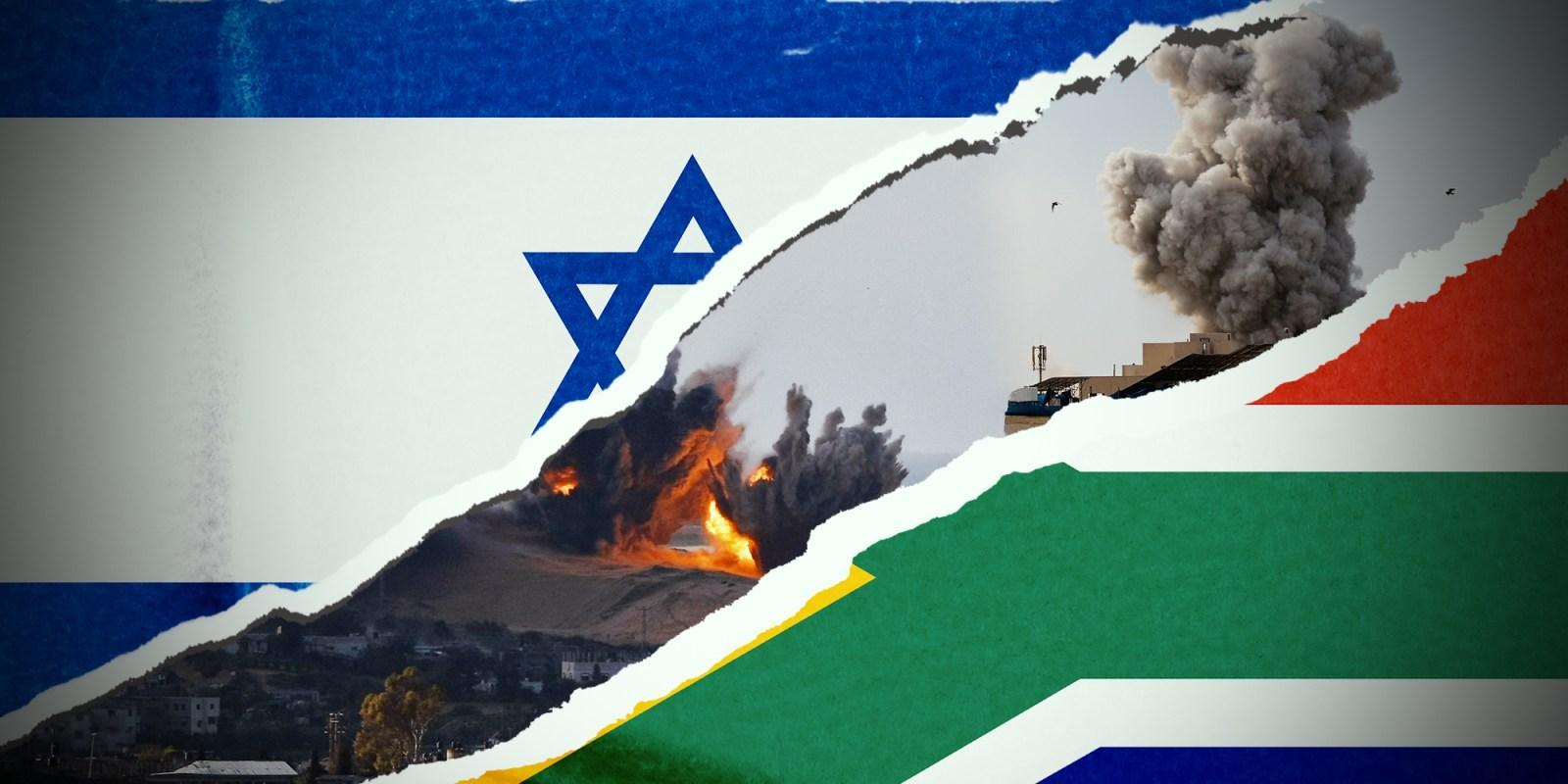Africa-Press – Lesotho. While the International Court of Justice (ICJ) provided interim relief on Friday in the case brought against Israel by South Africa, it is likely to continue for several years before the full merits of the case of whether Israel is perpetrating genocide against the Palestinian people are decided with finality.
For now, the ICJ has held that there is plausible evidence that a genocide is unfolding against the Palestinian people and has ordered provisional measures to prevent this from continuing.
The ruling was read by a judge nominated to the ICJ by US – ICJ president Joan Donoghue – a noteworthy development in and of itself considering the US’ historical, unqualified support for Israel despite its ongoing dispossession, occupation and oppression of Palestinians in the West Bank and Gaza.
In a well-structured ruling, the ICJ first dealt with the procedural hurdles. The first hurdle was put up by Israel, in respect of whether South Africa has jurisdiction to institute the case.
Article 9 of the Geneva Convention of 1948 allows a party to initiate a case if there is a dispute on a point of law or fact. Parties must hold fairly, opposite views.
This is an objective test focusing on the substance, not the form, of the statements. The ICJ relied on South Africa’s statements made in various multilateral and bilateral settings as well as a note verbale to Israel alleging genocide.
The ICJ also noted Israel’s response refuting accusations of genocide as well as referring to the allegations as “morally repugnant”. The court held that these, “clearly opposite views” demonstrated prima facie the existence of a dispute.
Second, even though Israel did not raise the issue of the standing of South Africa to initiate the case, the ICJ thought it necessary to address this point. The significance of this must not be overlooked.
The ICJ held that South Africa did have standing and noted that each state party to the convention has an interest in compliance with the convention in any given case.
The ICJ said: “[A]ny State party to the Genocide Convention may invoke the responsibility of another State party, including through the institution of proceedings before the Court, with a view to determining the alleged failure to comply with its obligations erga omnes partes (towards all or towards everyone) under the Convention and to bringing that failure to an end.
For South Africa to succeed in the interim case for provisional measures it had to make out a case that it is plausible that a genocide may be occurring in Gaza and, that there is a link between the rights requiring protection and the measures that are sought.
The ICJ held that at least some of the acts referred to by South Africa may be genocide. Article 2 of the convention defines genocide as any of the following acts committed with intent to destroy, in whole or in part, a national, ethnical, racial or religious group.
These are: Killing members of the group; Causing serious bodily or mental harm to members of the group; Deliberately inflicting on the group conditions of life calculated to bring about its physical destruction in whole or in part; Imposing measures intended to prevent births within the group; and Forcibly transferring children of the group to another group.
A determination of intent requires an inquiry into, first, expressions of special intent to commit genocide by those in authority (dolus specialis), and second, whether the acts perpetrated against the Palestinian people fall within the acts referred to in Article 2 of the convention.
The South African case highlighted the many statements of genocidal intent made by the Israeli government and army officials. The ICJ ruling mentioned Defence Minister Yoav Gallant’s reference to Palestinians as “human animals”.
The ICJ correctly accepted this dehumanising rhetoric, as well as other statements, as evidence of genocidal intent. There is a case under way in the US that seeks to hold the Biden administration accountable for its role in aiding and abetting the genocide in Gaza.
The evidence being provided by a group of genocide experts in the case notes: “Perpetrators of genocide rarely express their intentions as directly as Israel state leaders and senior army officers have done after October 7.
” Unlike South Africa, Israel did not make its submissions, or the evidence that it relied on, available to the public. In any legal matter, a case is only as good as the evidence that supports it.
South Africa meticulously put forward a credible case of the “total siege” on all aspects of Gazan life so as to meet the Article 2 threshold. It highlighted the deprivation of food, water, fuel and urgent medical supplies which it was alleged is calculated to inflict conditions on Palestinians to bring about their physical destruction.
Currently 93% of Palestinians in Gaza are experiencing crisis levels of hunger. The use of carpet bombs in one of the most densely populated places in the world was emphasised as evidence that Israel was not just targeting Hamas military operatives, but has as an objective the wide-scale destruction of the Gaza strip and its inhabitants.
South Africa’s case was supported by evidence from the various UN bodies and humanitarian agencies operating in Gaza and the evidence was made available to the ICJ and public for scrutiny.
The case of Israel is that it has the right to defend itself following the events of 7 October and that, in situations of urban warfare, civilian casualties may be an unintended consequence of the lawful use of force against military objects, and this does not constitute genocide.
It further dismissed the submissions by South Africa as to genocidal intent as “misleading at best”. Unlike South Africa, Israel did not make its submissions, or the evidence that it relied on, available to the public.
In any legal matter, a case is only as good as the evidence that supports it. The ICJ dismissed Israel’s defence and in doing so the court articulated in detail the devastation resulting from Israeli actions in Gaza.
Today, more than 26,000 Gazans have been killed. More than 75% of the deceased are women and children and more than 63,000 injuries have been reported.
More than 1.7 million Palestinians have been displaced and more than 360,000 homes damaged and destroyed. Essential infrastructure, such as schools, universities, churches, mosques and hospitals, has also been destroyed.
Thus, the ICJ held that “the facts and circumstances mentioned above are sufficient to conclude that at least some of the rights claimed by South Africa and for which it is seeking protection are plausible”.
Furthermore, the ICJ held that there is a link between the rights which need protection and the provisional measures being requested. A sceptical view is that any other conclusion as to the plausibility of a genocide would have rendered the ICJ moribund.
A more optimistic one is that, amid this humanitarian crisis, the ICJ has risen to the moment and international human rights law has prevailed over politics.
The ICJ held that it could order provisional measures only if there is urgency, in the sense that there is a real and imminent risk that irreparable prejudice will be caused to the rights claimed.
This condition of urgency is met when the acts likely to cause irreparable prejudice can “occur at any moment”. The ICJ noted many factors as evidence of irreparable harm to justify a finding of urgency.
Some of these are the constant bombardment of Gaza and that “nowhere is safe in Gaza”, statements from Israeli officials of the likelihood of the siege continuing for many more months, the collapse of the health system and the fact that 15% of the women giving birth in the Gaza Strip are likely to experience complications, potentially leading to an increase in maternal and newborn death rates due to the lack of access to medical care.
The ICJ, having found that the conditions to provide provisional measures had been met, noted that it need not indicate provisional measures identical to those requested by South Africa.
The court, therefore, ordered Israel to: Take all measures within its power to stop the acts set out in Article 2 and to ensure that the military does not commit any of these acts; Take all measures within its power to prevent and punish the direct and public incitement to commit genocide;
Take immediate and effective measures to enable the provision of urgently needed basic services and humanitarian assistance to address the adverse conditions of life faced by Palestinians in the Gaza Strip;
Take effective measures to prevent the destruction and ensure the preservation of evidence related to allegations of acts. This is necessary to assess the merits of the main case; and
Provide a report within one month on the order of steps taken to ensure compliance. The ruling is legally binding. The main difference between the order of the ICJ and South Africa’s request is that the ICJ did not require that Israel immediately suspend military operations in Gaza.
Presumably, the phrase requiring Israel to take all measures “within its power” is to give Israel space for military action against Hamas, while allowing for humanitarian aid to enter Gaza.
The lack of an order for a ceasefire has led some to claim that the ICJ ruling will have no real impact. International Relations and Cooperation Minister Naledi Pandor’s interpretation, however, is that the ruling effectively requires a ceasefire, in order for humanitarian aid to be delivered.
The symbolic value of the ICJ case as a moral victory is immense. Proponents of Palestinian self-determination will seek to leverage the ruling with the ultimate objective of realising the decades-long struggle for Palestinian statehood.
State parties are also potentially duty bound to impose sanctions on Israel should it continue to perpetuate acts of genocide against Palestinians. The prosecutors of the International Criminal Court (ICC) have been criticised for failing to act against individuals alleged to be perpetrators of war crimes against Palestinians.
It is likely that the ICJ’s ruling will increase the pressure on the ICC prosecutors to act expeditiously against individual Israeli political and military officials responsible for war crimes.
Nothing precludes the ICC from pursuing similar investigations against Hamas leaders and military operatives for alleged war crimes committed on 7 October 2023.
As noted, the unsolicited decision by the ICJ ruling to emphasise the principle of erga omnes partes is significant. It has now been explicitly established that all states parties to the convention have a duty to prevent a genocide against the Palestinian people.
This means that when the ICJ ruling is referred to the UN Security Council to be enforced, the US would be undermining the international rule of law should it once again veto another Security Council resolution in respect of Israel’s actions.
State parties are also potentially duty bound to impose sanctions on Israel should it continue to perpetuate acts of genocide against Palestinians. On the same day the ICJ ruling was delivered, a federal court in Oakland began hearing arguments in a lawsuit accusing the Biden administration of failing to prevent a genocide in Gaza.
The case was initiated by the Center for Constitutional Rights on behalf of two Palestinian organisations and eight Palestinians living in the US. Several human rights organisations, including in South Africa, are supporting the case which seeks to interdict the US government from providing military funding and technologies and diplomatic support to Israel. The ICJ holding in respect of the duties of state parties in terms of the convention could well have a bearing on this case too.
For More News And Analysis About Lesotho Follow Africa-Press






